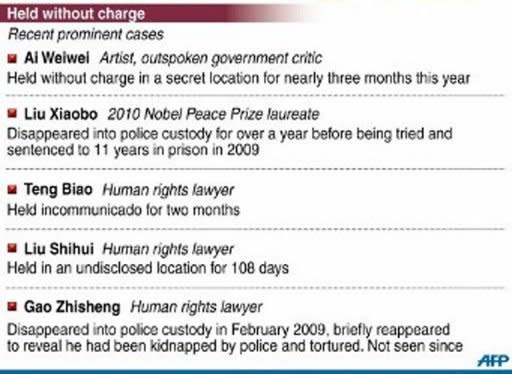China says to limit secret detentions
China said Sunday that secret detentions will be "strictly limited" despite planned changes to the criminal law which will allow police not to tell suspects' families where they are being held. The rubber-stamp National People's Congress, which opens its annual session on Monday, is expected to approve a series of proposed amendments to the Criminal Procedure Law, which activists fear will legalise secret detentions. "We have improved the criteria for detentions... and also strictly limited situations where family members are not notified when a person has been subject to compulsory measures," government spokesman Li Zhaoxing told reporters. But Amnesty International China researcher Sarah Schafer said Li's comments were vague and it was not clear if legislators had watered down the original provisions relating to secret detentions. "Until we see the actual draft we can not know for certain what has changed," Schafer told AFP. Proposed changes to the law published last year would make it legal to detain suspects for up to six months, without charge, in secret locations away from police stations and official prisons. In cases involving national security, terrorism or major corruption, police would not be obliged to contact the family members of suspects. The clauses triggered an uproar, with critics saying the changes amounted to legalising human rights violations. Prominent activist Hu Jia compared them to methods used by the former Soviet Union's KGB secret police. The practice of so-called "enforced disappearances" already exists in China, but the amendments would give it extra legal clout. But Chen Guangzhong, the influential honorary chairman of the China Legal Society, told AFP last week he had seen the latest draft of the law, and legislators had deleted some of what critics have dubbed the "disappearance clauses." Chen said the new draft now requires police inform family members of the whereabouts of suspects arrested or placed under residential surveillance within 24 hours. But he cautioned that in the case of criminal detentions -- legally different to arrests -- police have been given a longer period of 37 days to inform families, if such a notification impedes their investigation. Schafer said: "I sincerely hope that the provision for keeping people in secret detention... especially those under suspicion of endangering state security or terrorism has been dropped. "Until we see the draft we don't really know what they are saying." The draft amendments are not yet publicly available and officials at the National People's Congress media centre told AFP they did not have a copy.



